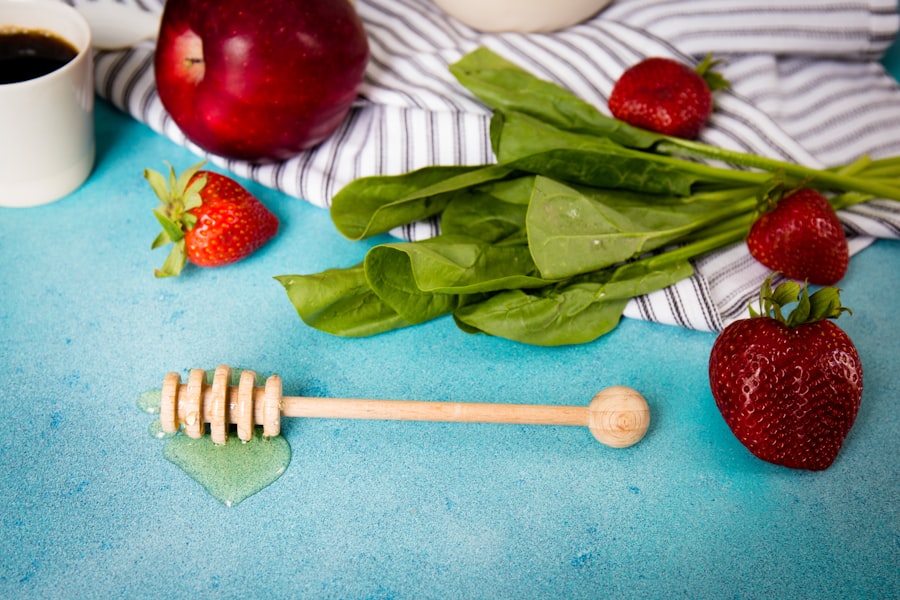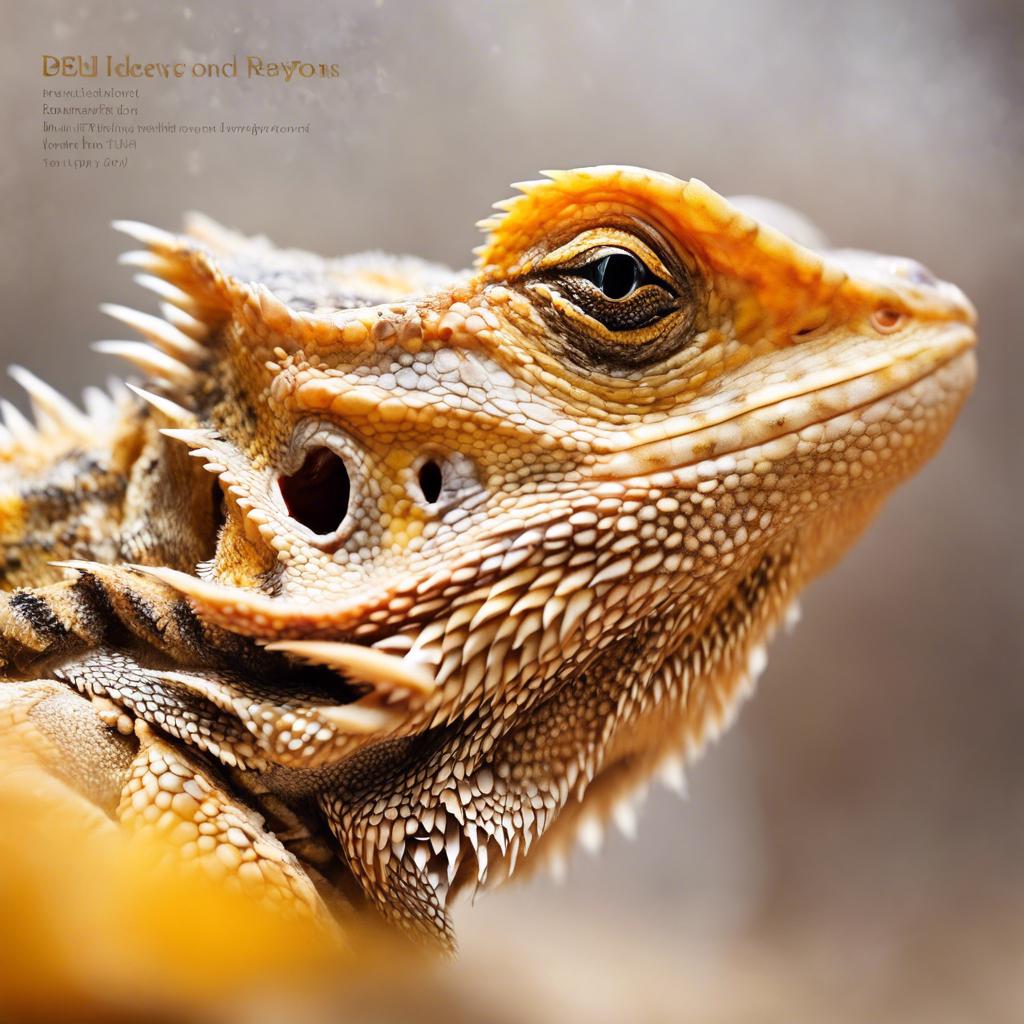Bearded dragons are popular reptile pets known for their unique appearance and docile nature. These reptiles are native to Australia and have become increasingly popular as pets due to their friendly demeanor and relatively low maintenance requirements. One of the most important aspects of caring for a bearded dragon is providing them with a proper diet.
Proper nutrition is crucial for the overall health and well-being of bearded dragons. A balanced diet ensures that they receive all the necessary nutrients to support their growth, development, and immune system. In the wild, bearded dragons are omnivorous, meaning they eat a combination of insects, vegetables, and fruits. As captive pets, it is important to replicate their natural diet as closely as possible.
Key Takeaways
- Bearded dragons are popular pets that require a balanced diet to stay healthy.
- Honey is not a natural part of a bearded dragon's diet and should be given in moderation, if at all.
- Honey contains some beneficial nutrients for bearded dragons, but it is also high in sugar and can cause digestive issues.
- If you choose to feed your bearded dragon honey, it should be raw and unpasteurized, and only given as an occasional treat.
- There are many alternative foods that are safer and more nutritious for bearded dragons, such as leafy greens, vegetables, and insects.
Understanding Bearded Dragon Diet
In the wild, bearded dragons primarily feed on insects such as crickets, mealworms, and roaches. They also consume a variety of leafy greens, vegetables, and fruits. This combination of animal protein and plant matter provides them with the necessary nutrients to thrive.
For captive bearded dragons, it is recommended to feed them a diet that consists of 70% insects and 30% plant matter. The insects should be gut-loaded, meaning they are fed a nutritious diet before being fed to the bearded dragon. This ensures that the reptile receives optimal nutrition from its prey.
The plant matter should include a variety of leafy greens such as collard greens, kale, and dandelion greens. Vegetables like carrots, bell peppers, and squash can also be included in their diet. Fruits should be given sparingly as they are high in sugar.
Can Bearded Dragons Eat Honey?
Now let's address the question at hand: can bearded dragons eat honey? The answer is yes, but in moderation. Honey can be given as an occasional treat for bearded dragons, but it should not be a regular part of their diet. It is important to note that honey should only be given to adult bearded dragons and not to hatchlings or juveniles.
There are some common misconceptions about feeding honey to bearded dragons. Some people believe that honey can be used as a substitute for water, but this is not true. Bearded dragons require fresh water for hydration, and honey should never be used as a replacement.
Nutritional Value of Honey for Bearded Dragons
Honey contains a variety of nutrients that can benefit bearded dragons when given in moderation. It is a natural source of carbohydrates, which provide energy for the reptile. Honey also contains small amounts of vitamins and minerals such as vitamin C, calcium, and iron.
The natural sugars found in honey can provide a quick energy boost for bearded dragons. However, it is important to remember that honey is high in sugar and should only be given sparingly. Too much sugar can lead to weight gain and other health issues in bearded dragons.
Benefits and Risks of Feeding Honey to Bearded Dragons
Feeding honey to bearded dragons can have some potential benefits. The natural sugars in honey can provide a quick energy boost, which can be beneficial for sick or weak bearded dragons. Honey also has antimicrobial properties, which can help fight off infections.
However, there are also risks and potential negative effects of feeding honey to bearded dragons. As mentioned earlier, honey is high in sugar and should only be given sparingly. Too much sugar can lead to obesity, diabetes, and other health issues in bearded dragons.
Another risk of feeding honey to bearded dragons is the potential for bacterial contamination. Honey can sometimes contain spores of Clostridium botulinum, which can cause botulism in reptiles. To minimize this risk, it is important to use high-quality honey and avoid feeding honey to bearded dragons that are immunocompromised or have a weakened digestive system.
How to Feed Honey to Bearded Dragons

If you decide to feed honey to your bearded dragon, it is important to do so safely and in moderation. Here are some step-by-step instructions on how to feed honey to bearded dragons:
1. Choose high-quality honey: Look for raw, unprocessed honey that does not contain any additives or preservatives.
2. Dilute the honey: Mix a small amount of honey with water to dilute it. The ratio should be approximately 1 part honey to 3 parts water.
3. Offer the diluted honey: Place a small amount of the diluted honey in a shallow dish and offer it to your bearded dragon. Monitor their intake and remove any uneaten honey after a few hours.
4. Limit the frequency: Honey should only be given as an occasional treat, no more than once a month.
It is important to note that some bearded dragons may not show interest in honey, while others may enjoy it. Each reptile is unique, so it is important to observe their behavior and adjust their diet accordingly.
Alternatives to Honey for Bearded Dragons
If you are concerned about the risks associated with feeding honey to bearded dragons, there are alternative foods that can provide similar nutrients. Some options include:
1. Agave nectar: Agave nectar is a natural sweetener that can be used as an alternative to honey. It is lower in sugar and has a lower glycemic index than honey.
2. Bee pollen: Bee pollen is a nutrient-rich food that can provide vitamins, minerals, and protein for bearded dragons. It should be given sparingly as an occasional treat.
3. Fruits and vegetables: Bearded dragons can also receive nutrients from a variety of fruits and vegetables. Some options include blueberries, raspberries, bell peppers, and leafy greens.
These alternatives can provide similar nutrients to honey without the potential risks associated with bacterial contamination or excessive sugar intake.
Bearded Dragon Care Tips
In addition to providing a balanced diet, there are some general care tips that can help ensure the health and well-being of your bearded dragon:
1. Provide a suitable habitat: Bearded dragons require a spacious enclosure with proper lighting, heating, and humidity levels. The enclosure should also include hiding spots and climbing structures.
2. Maintain proper temperature: Bearded dragons are ectothermic, meaning they rely on external heat sources to regulate their body temperature. Provide a basking spot with a temperature of around 95-105°F (35-40°C) and a cooler area with a temperature of around 75-85°F (24-29°C).
3. Offer fresh water: Bearded dragons should have access to fresh, clean water at all times. The water should be changed daily to prevent bacterial growth.
4. Regular veterinary check-ups: Schedule regular check-ups with a reptile veterinarian to ensure that your bearded dragon is in good health. They can provide guidance on diet, habitat setup, and any other concerns you may have.
Signs of Digestive Problems in Bearded Dragons
It is important to monitor your bearded dragon for any signs of digestive problems. Some common signs include:
1. Loss of appetite: If your bearded dragon suddenly stops eating or shows a decreased appetite, it could be a sign of digestive issues.
2. Diarrhea or loose stools: Abnormal bowel movements can indicate an underlying digestive problem.
3. Regurgitation or vomiting: If your bearded dragon is regurgitating or vomiting its food, it may be experiencing digestive issues.
4. Weight loss or poor growth: If your bearded dragon is not gaining weight or is losing weight despite a proper diet, it may be a sign of digestive problems.
If you notice any of these signs, it is important to seek veterinary care for your bearded dragon. A veterinarian can perform a thorough examination and provide appropriate treatment.
Conclusion and Final Thoughts on Feeding Honey to Bearded Dragons
In conclusion, honey can be given as an occasional treat for adult bearded dragons, but it should not be a regular part of their diet. While honey does contain some beneficial nutrients, it is high in sugar and can pose risks if given in excess. It is important to make informed decisions about feeding honey to your bearded dragon and to monitor their health and behavior closely.
Remember that a balanced diet is crucial for the overall health and well-being of bearded dragons. Providing a variety of insects, leafy greens, vegetables, and fruits will ensure that they receive all the necessary nutrients to thrive. If you have any concerns or questions about your bearded dragon's diet or health, consult with a reptile veterinarian for guidance.
If you're wondering whether bearded dragons can eat honey, you'll find the answer in this informative article from Reptile Wizard. They provide expert advice on reptile keeping and have a comprehensive guide on what foods are safe for bearded dragons. To learn more about the dos and don'ts of feeding your bearded dragon, check out their article on can bearded dragons eat honey here.
FAQs
What is a bearded dragon?
A bearded dragon is a type of lizard that is native to Australia. They are popular pets due to their docile nature and unique appearance.
What do bearded dragons eat?
Bearded dragons are omnivores and eat a variety of foods including insects, vegetables, and fruits.
Can bearded dragons eat honey?
While honey is not toxic to bearded dragons, it is not recommended as a regular part of their diet. Honey is high in sugar and can cause digestive issues if consumed in large amounts.
What are the risks of feeding honey to bearded dragons?
Feeding honey to bearded dragons can lead to obesity, diarrhea, and other digestive issues. It can also cause a spike in blood sugar levels, which can be harmful to their health.
What are some alternative foods for bearded dragons?
Bearded dragons can be fed a variety of insects such as crickets, mealworms, and dubia roaches. They can also eat a variety of vegetables and fruits such as kale, collard greens, carrots, and berries. It is important to research and provide a balanced diet for your bearded dragon.

